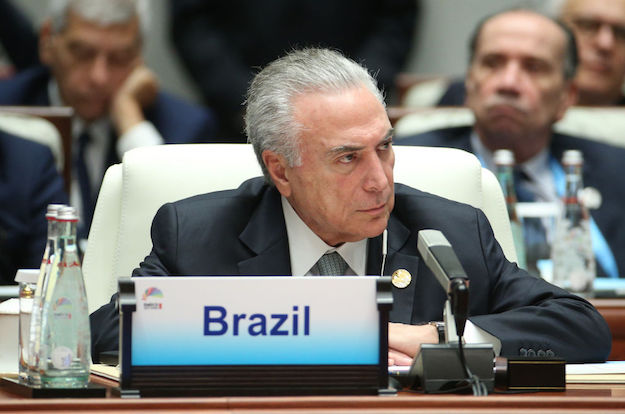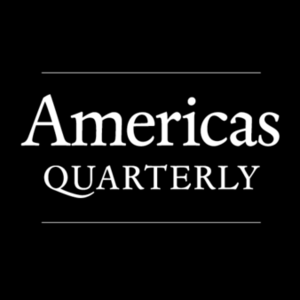
(Photo credit should read WU HONG/AFP/Getty Images)
http://americasquarterly.org/content/temer%E2%80%99s-final-brics-summit-golden-opportunity-brazil
BY OLIVER STUENKEL | JULY 5, 2018
Geopolitical divisions in the West could give Brazil and its partners a chance to increase their influence.
Brazilian President Michel Temer’s third and final trip to the BRICS Summit may well be his most meaningful. The 10th annual meeting, which will bring together the leaders of Brazil, Russia, India, China and South Africa from July 25 to 27 in Johannesburg, comes amid profound uncertainty about the future of the global economic order – and doubts about the West’s continued ability to set the agenda for international affairs. This creates an opportunity for the BRICS to assume a more prominent role.
The current state of the G7, a grouping of the world’s largest developed economies, is a case in point. At the group’s most recent meeting in Canada, President Donald Trump insisted on removing the term “rules-based international order” from the meeting’s communiqué, then withdrew the U.S.’ signature altogether. It is increasingly evident that Trump is seeking to undermine the European Union, too, by providing active support for Euroskeptic forces across the continent. In light of such monumental global changes and a vacuum of power not seen since the end of the Cold War, the BRICS countries may currently agree with each other on more than do the world’s most advanced economies.
This marks a major turn of events. Over the past decade, critics of the BRICS have repeatedly pointed to the many disagreements between its member states to argue that their different worldviews make meaningful cooperation unlikely. After all, Brazil, India and South Africa are democracies, while Russia and China are authoritarian regimes; India and China even face an unresolved border dispute.
Yet contrary to such expectations and despite internal differences, the grouping has not only continued to organize yearly presidential summits, but also undergone an impressive process of institutionalization. The creation of a joint development bank, tens of yearly minister-level intra-BRICS meetings, and close cooperation on issues ranging from IMF reform to counterterrorism, are key examples of the kind of productive multilateralism that Trump is dismantling elsewhere.
The BRICS have good reason to deepen this kind of cooperation. Brazil may not be as directly affected by Trump’s foreign policy revolution as countries like Germany or Mexico, but there are clear signs that U.S. policy poses a severe threat to its economic interests. In response to U.S.’ tariffs on Brazilian steel, for example, the EU will likely impose limits of its own to keep global shipments intended for the U.S. from flooding the European market. With the outcome of trade negotiations with the EU uncertain, the BRICS members are today relatively reliable commercial partners – even though China recently angered Brazil by imposing tariffs on Brazilian chicken.
What is true for Brazil is valid for the global order as a whole. While far from exemplary free-trading nations, the BRICS at least do not actively seek to undermine the current global trading system. In the worst-case scenario, the United States will succeed in bringing about a global trade war. In a better and more likely scenario, globalization will continue without the United States. Either way, Brazil has little choice but to increasingly rely on its BRICS partners, above all China.
And yet, despite approaching its 10th anniversary, doubts still linger about what role the BRICS grouping can play, and to what extent it can provide much-needed global public goods. Debates at BRICS events are often stale, dominated by official language and lacking in dynamism. Brazil is partly to blame: its participation in the grouping has been too passive, especially since the administration of former President Dilma Rousseff. The Chinese and Russian governments frequently propose new intra-BRICS initiatives, and…
Read full article here.
—–
Read more:
Pessimism About Brazil Is Overblown (Americas Quarterly)
Brazil must urgently learn how to operate in a more China-centric world
São Paulo to Addis Ababa: A Revealing Journey (Americas Quarterly)









